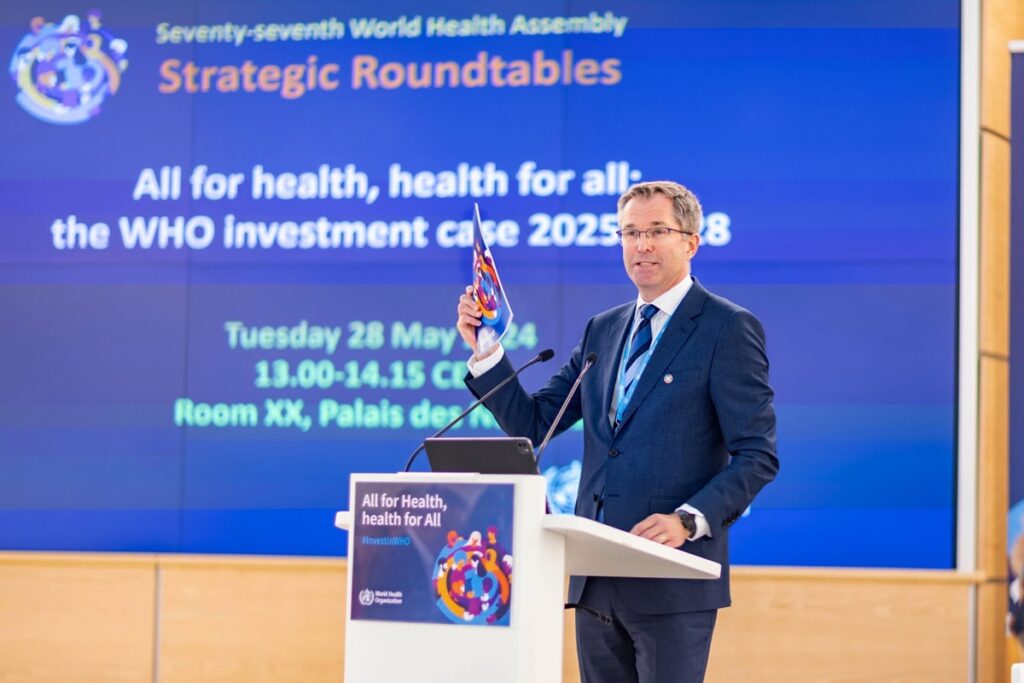WHO on Tuesday unveiled an investment proposal highlighting the organization's key contributions to global health, calling for investments in its 2025-2028 strategy to save 40 million lives and improve the health of six billion people.
The investment will form the basis for a WHO investment round, The investment round launched on Sunday and garnered many strong expressions of support, commitments from co-host countries and initial pledges that will build momentum towards the conclusion of the investment round later this year.
Statements of support and funding pledges were made by Member States and the European Union at a launch event on Tuesday at the Strategic Roundtable of the 77th World Health Assembly.
“I thank Brazil, in its capacity as the Presidency of the G20, hosting the Investment Round alongside France, Germany and Norway, and Mauritania in its capacity as Chair of the African Union,” WHO Director-General Dr. Tedros Adhanom Ghebreyesus said at Tuesday's event. “I also thank the G7 Finance Ministers for their recent call for increased funding for WHO through the Investment Round, and I thank all Member States and other donors for their voluntary contributions, especially those already providing predictable and flexible funding.”
The 40-page Investment Case is packed with data and examples of WHO's achievements, from women's health to antimicrobial resistance (AMR) to eliminating infectious diseases, and shows how the organization can scale up its impact to generate a $35 return for every dollar invested, illustrating what WHO can achieve with sustainable financing.
WHO's General Plan of Work (GPW 14), its global health strategy approved on Tuesday, calls for close collaboration with member states and partners across a wide range of health needs in an era of climate change, geopolitical turmoil, mass migration and other complex challenges.
Support and funding commitments
In the Investment Round, WHO is not seeking further funding, but rather soliciting voluntary contributions up front to ensure that the four-year strategy is fully implemented. Member states' membership fees only cover a portion of the costs of WHO's authorized activities. The Investment Round is seeking funds to fill a shortfall of $7.1 billion.
At the event, Singapore's Minister of Health Ong Ye Kung announced that his country would contribute S$24 million (US$18 million) to the investment round. Ireland's Minister of Health Stephen Donnelly announced that his country would immediately front-load its estimated contribution to 2028-2029 levels with additional flexible funding.
The European Union also reaffirmed its commitment to the WHO.
““We want a sustainably funded, accountable and effective WHO. Today I am proud to announce a contribution of more than €250 million by the European Commission as part of the WHO investment round,” Commissioner for International Partnerships Jutta Urpilanen said in a video address.
On Sunday, at the launch of the investment round, the Charitable Society pledged $1.2 million to support the health of migrants and displaced people affected by climate change.
What WHO will deliver between 2025 and 2028
The investment case details how the actions outlined in GPW 14 could save 40 million lives by focusing on health emergencies, antimicrobial resistance (AMR), maternal and child health, infectious and non-communicable diseases, immunization, the impacts of climate change, and risk factors such as tobacco, alcohol, physical activity and diet.
WHO's 2025-2028 strategy builds on the organization's ongoing commitment to promote, deliver and protect health, and the investment case provides examples of activities that will support that commitment over the next four years through text, data and graphics.
This includes installing solar power to 10,000 health facilities and making them fully functional, supporting the training and employment of 3.2 million health workers in 55 countries, increasing the number of vaccines provided to priority countries, providing access to health services to more than 150 million people in humanitarian settings in 30 countries, helping 84 countries reach their goals of eliminating malaria, mother-to-child HIV transmission and other diseases, detecting and taking action on 30 health threats each month, enhancing access to timely and reliable health data, and pre-qualifying 400 health products per year.
Over the past five years, WHO has helped countries apply the latest science and health solutions, delivering measurable results: 1.2 billion people are living healthier lives thanks to reduced risks and healthier environments; nearly 430 million people are able to access essential health services without financial hardship; and 600 million people are better protected from health emergencies. All of this has been achieved with an annual budget of US$ 2.75 billion, or less than US$ 0.35 per capita.


